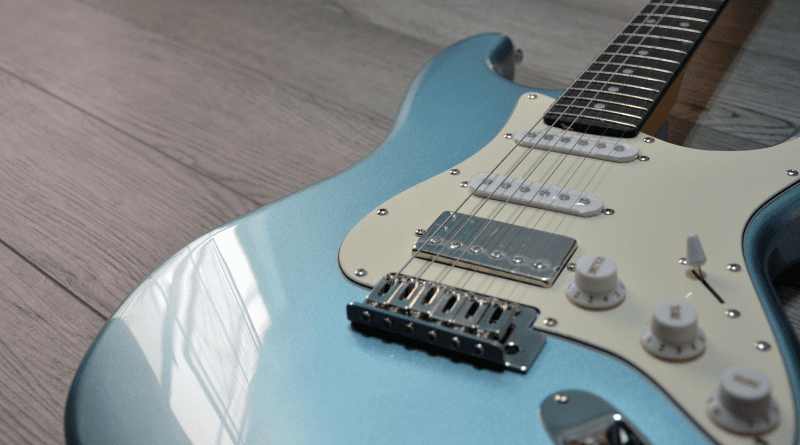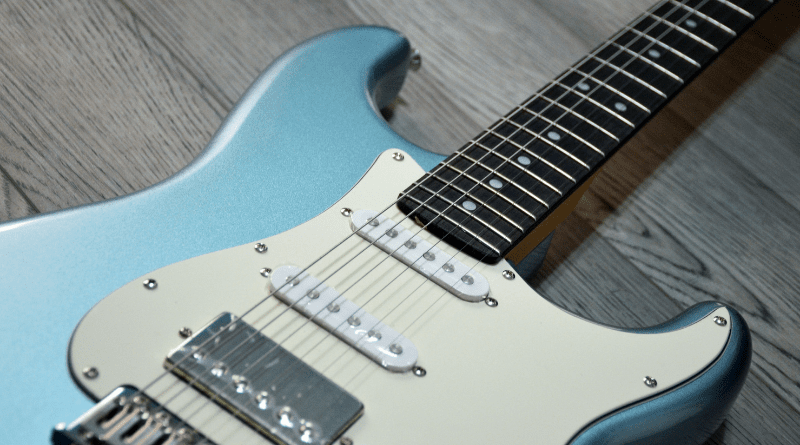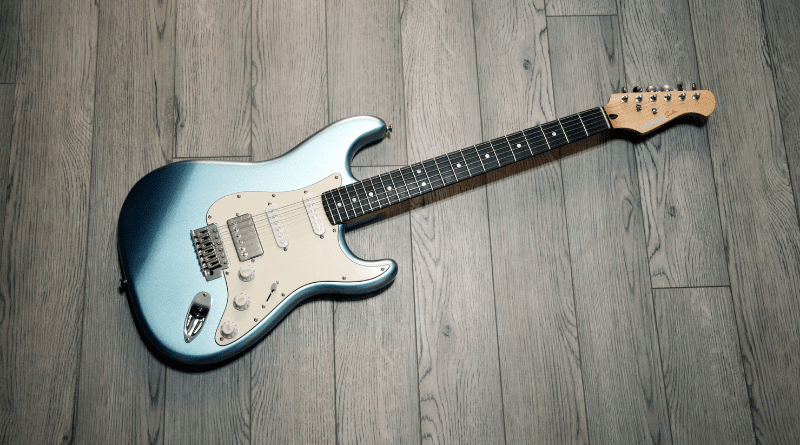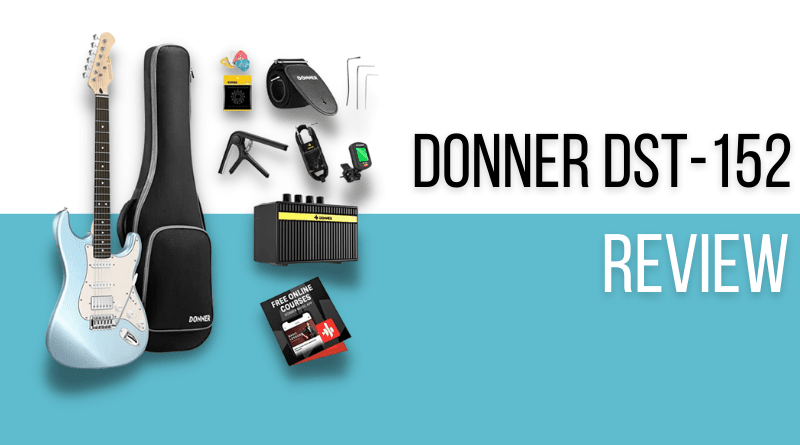Donner has come from relative obscurity to become a fairly well recognized name in the sphere of low cost guitars and gear. They offer a number of guitars in some of the most common styles including Les Paul, Telecaster, and Stratocaster, all of which are available for less than $200.
In this KillerGuitarRigs Review, we took a look at one of their latest arrivals, the DST-152. This is a Strat style guitar that comes complete with a whole array of accessories, including a practice amp.
We’ve reviewed a couple of Donner guitars in the past, with mixed results, so we were keen to see how the DST-152 (provided by Donner for this review) would stack up. Keep on reading to see what we thought.
Read more about our review process.
Contents
Who Is This For?

The Donner DST-152 is aimed at beginner players. It’s a full size model, so we think it would be better suited to teens and adult players, as younger kids might have a tough time handling it properly.
Because it comes with everything you need right in the box, it’s really a plug and play set, which also makes it a good option if you’re planning to gift it to somebody else.
It should also be noted that the DST-152 is one step up from Donner’s mega-budget DST-100 strat style guitar, and sits below their Seeker series strat, the DST-400, which we will be reviewing at a later date.
Appearance / Features / Controls

Our first impressions of the DS-152 were great. The quality of the packaging was excellent, with the guitar being properly secured to prevent damage during transport – it even included a well padded gig bag.
The finish was really nicely applied, with no overrun, and no sticky feeling from the clear coat. We received a Polar Blue guitar for our review, but it’s also available in Sunburst, Black, and White if blue isn’t your color.
Mirroring what you’d find on similarly priced models from Squier, it came with a solid poplar body, which we found to be light weight, and a close match to the shape and ergonomics of a Stratocaster.
It had a maple C profile neck, which was quite comfortable, although we weren’t huge fans of the almost unfinished feel, which really would have benefitted from a satin lacquer.
The fretboard was made from an unidentified wood, which we think was likely pau ferro or Indian laurel. It was quite dry, but that would be easily remedied with some conditioning oil. We found that the fretwork was actually quite well executed. The edges weren’t perfect, but there was nothing sharp enough to cause discomfort or injury.
Hardware was all quite standard for a guitar at this price. It was all stamped pot metal, but it was more than fit for purpose. The tuners had vintage style buttons, and it was equipped with a 6 point trem system.
It had an HSS pickup layout, with a 5 way selector switch, and it even had coil splitting, giving both single coil and humbucker tones in the bridge position.
As far as the accessories went, it came with a gig bag, a cable, a USB rechargeable practice amp, a pack of picks, adjustment Allen wrenches, a trem arm, spare strings, a strap, a clip on tuner, a capo, and access to the Donner app for free online lessons.
Performance/Sound

The DS-152 gave a good account of itself right from the beginning. It’s not going to fool you into believing you’re playing a Fender, but for a budget student guitar, the playability and tones were quite impressive.
The action was just about right for a beginner electric – enough height to prevent fret buzz, but low enough to be comfortable. As for the rest of the setup, we found the neck to be good and straight, and there were no issues with intonation. The most disappointing element was the nut, which was poorly cut and caused some hang ups, especially with big bends and trem use.
On the topic of the trem, the bridge was decked from the factory, which is pretty common on Strat type guitars. It could be set up to float, but we wouldn’t recommend it for this Donner. Anything more than light, infrequent use caused real issues with tuning stability, so in reality, we’d actually recommend blocking it altogether.
The biggest surprises with the DS-152 were the pickups. All too often with inexpensive guitars, pickups are an afterthought, but we actually got some nice tones from them. The neck position was warm and well balanced, and retained clarity even when the treble was rolled back. The middle pickup was a little bland, but it was far from muddy.
In the bridge position with both coils engaged we were able to get some bright, punchy tones, that sounded especially good with some overdrive engaged. After pulling out the tone pot and splitting the coil we got some really nice trebly Strat lead tones. It was a bit thinner than you’d find with a high end pickup, but it was still useable, and unlocked additional tones that are rarely found on guitars at this price point.
While we performed the majority of the testing on a Boss Katana 50 to get a more realistic impression of the guitar, we also made sure to test the practice amp that came bundled with it. It was nice and easy to use, and having USB recharging capability made it especially convenient, as the majority of amps of this size rely on batteries or sold-separately power cords. It had 3 watts of power, and was surprisingly loud with the gain and volume cranked. One of the highlights was the aux in feature, which allowed us to plug in a phone to play backing tracks through the amp.
Final Thoughts in our Donner DS-152 Review
Our experience with the Donner DS-152 was a positive one. While there were some elements that could definitely have been improved upon, it was still a good looking and serviceable guitar, and the accessories were all of decent quality.
For any beginners on a tight budget looking for a complete starter set, this kit is definitely worth your consideration. It’s inexpensive, and overall an ideal setup for learning the foundations.


